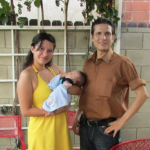AIDS/HIV
The news over the past 24 hours has exclaimed over and over:
HIV's Patient Zero Exonerated
How scientists proved the wrong man was blamed for bringing HIV to the U.S.
Researchers Clear "Patient Zero" from AIDS Origin Story
H.I.V. Arrived in the U.S. Long Before ‘Patient Zero’
Gaetan Dugas: "patient zero" not source of HIV/AIDS outbreak, study confirms
HIV's supposed "Patient Zero" in the U.S., Gaetan Dugas, is off the hook! He wasn't responsible for our outbreak!
This is presented as new information.
Gaetan Dugas, from Wikipedia.
It is not, and I think by focusing on the "exoneration" of…
Long-term readers of the blog know of my interest in HIV denialism, especially as it is maintained and spread via the Internet. In my online travels, I recently met John Strangis via this blog post. John has an interesting story to tell regarding his experiences with HIV denialism and subsequently, his turn to patient and science activism. Many thanks to John for sharing it here.
John with his wife and son.
TS: Can you tell the readers a bit about yourself?
JS: My name is John Strangis. I was born in the United States from Italian parents but lived for fifteen…
Student guest post by Carrie Ellsworth
During the summer of 2010 I spent two months in Ghana studying a parasite called schistosomiasis. We worked in a small town called Adasawase to determine prevalence and treat the schoolchildren who were infected. We were told that schistosomiasis was not a major health concern for the people in the town because they were often faced with other diseases that had more immediate and severe health consequences than a parasitic infection. It became apparent that if we wanted the people of this small town to take this health threat seriously, we needed to…
It's time for this year's second installment of student guest posts for my class on infectious causes of chronic disease. Third one this round is by Jack Walsh.
The Human Immunodeficiency Virus (HIV) infection is one of the most significant global health challenges of this 21st century. Since the isolation of the virus in 1983, it has infected 70 million people among whom 35 million have died of Acquired Immunodeficiency Syndrome (AIDS).1 Although important progresses have been made in slowing down the pandemic and reducing the morbidity and mortality related to HIV/AIDS with…
Fifth of five student guest posts by Jonathan Yuska
The saying, “The more you know, the more you can control,” is no more meaningful than when used in the context of HIV detection and prevention. Public health advocates endlessly stress the need for knowing one’s status; and one would assume that any way in which the most amount of people can be tested would be beneficial for the population1. The Food and Drug Administration shared this same idea when they overwhelmingly approved the first ever over-the-counter (OTC) HIV testing kit in 20052; which in theory, sounds like a promising…
Second of five student guest posts by Nai-Chung N. Chang
Tuberculosis (TB) is a major disease burden in many areas of the world. As such, it was declared a global public health emergency in 1993 by the World Health Organization (WHO). It is a bacterial disease that is transmitted through the air when an infected individual coughs, sneezes, speaks, or sings. However, not all individuals who contract the disease will display symptoms. This separates the infected into two categories, latent and active. Latent individuals are non-infectious and will not transmit the disease, whereas active…
Regular readers don't need to be told that I'm a bit obsessed with zoonotic disease. It's what I study, and it's a big part of what I teach. I run a Center devoted to the investigation of emerging diseases, and the vast majority of all emerging diseases are zoonotic. I have an ongoing series of posts collecting my writings on emerging diseases, and far too many papers in electronic or paper format in my office to count. Why the fascination? Zoonotic diseases have been responsible for many of mankind's great plagues--the Black Death, the 1918 "Spanish" flu pandemic, or more recently, HIV/AIDS…
I know summer is winding down, but there's still plenty of beach time left and some great books to take along with you. Two giants in the field have recently released memoirs of their respective fights against infectious diseases: William Foege's House on Fire: The Fight to Eradicate Smallpox and Peter Piot's No Time to Lose: A Life in Pursuit of Deadly Viruses.
I'll begin with William Foege. Foege is a native Iowan, an Epidemic Intelligence Service alum, and former director of the Centers for Disease Control and Prevention. His book, as the title suggests, focuses on his role in the fight…
We all know of once-respected scientists who ended up going off the deep end, adhering to an unproven idea despite massive evidence to the contrary. Linus Pauling and his advocacy of megadoses of Vitamin C, or Peter Duesberg's descent into HIV denial. It's all the more disappointing when the one taking a dive is a woman, since there are, compared to men, relatively fewer female "big names" in the sciences. So when one goes from views that were, perhaps, outside of the mainstream (but later proven largely correct) to complete science denialism, it makes it all the more depressing. Even worse,…
Readers may be interested in participating in this, from Dave Wessner at Davidson College:
Building on a project I piloted last fall, I will explore the potential role of Twitter more intentionally this fall in a course I teach on HIV/AIDS at Davidson College. I invite you to join me in this exploration.
Here are a few details:
Basically, I am interested in extending the class conversation outside the classroom walls and beyond the appointed class hours. I want the students to begin thinking on their own about what aspects of the subject (HIV/AIDS, in this case) truly interest them. I want to…
Student guest post by Francis Mawanda.
HIV/AIDS is a major public health problem worldwide. To date, it is estimated that more than 60 million people have been infected with HIV and more than 25 million people have died as a result of HIV/AIDS worldwide1. Despite the high prevalence and mortality rates that are associated with HIV/AIDS, and after more than 29 years of aggressive research efforts, there is still no cure or vaccine to prevent against HIV/AIDS. And although the introduction of antiretroviral (ARV) drugs in the mid 1990s greatly improved the outlook, health and quality of life…
Well, shit. Just as I mentioned ERV's post on HIV denial today, I read over at Respectful Insolence that Christine Maggiore has died from pneumonia. Maggiore, you may recall, made national news by refusing to take AZT while pregnant (although she was HIV positive). Her daughter, Eliza Jane, died at the age of 3 in 2005 from AIDS-related pneumonia. It would appear that her mother succumbed to the same illness:
According to officials at the Los Angeles County coroner's office, she had been treated for pneumonia in the last six months. Because she had recently been under a doctor's care, no…
Still playing end-of-year catch-up with grants and manuscripts so posting will be sporadic, but I'd be remiss not to mention this story regarding presidential candidate Mike Huckabee's past views on HIV/AIDS:
In 1992, Huckabee wrote, "If the federal government is truly serious about doing something with the AIDS virus, we need to take steps that would isolate the carriers of this plague."
"It is difficult to understand the public policy towards AIDS. It is the first time in the history of civilization in which the carriers of a genuine plague have not been isolated from the general population…
In our paper on HIV denial, Steven and I started the introduction off with a note about South African president Thabo Mbeki:
This denial was highlighted on an international level in 2000, when South African president Thabo Mbeki convened a group of panelists to discuss the cause of AIDS, acknowledging that he remained unconvinced that HIV was the cause. His ideas were derived at least partly from material he found on the Internet. Though Mbeki agreed later that year to step back from the debate, he subsequently suggested a re-analysis of health spending with a decreased emphasis on HIV/AIDS.…
For those of you who might not brave the comments threads on any HIV post, you may have missed this tidbit of information. I've written about "investigative journalist" Liam Scheff previously; he's an HIV "dissident" and author of a story from a few years back titled "The House that AIDS Built". In this, he claimed that HIV+ children had been removed from their parents' homes and force-fed "toxic" drugs to treat their condition (which of course, he claims is based on "inaccurate" HIV testing in the first place):
The drugs being given to the children are toxic - they're known to cause…
A reader passed along a link to this post on Short memories: AIDS denialism and vaccine resistance. The author learned that a friend had dated an AIDS denialist:
This was absolutely the wrong thing to say to our friend, who had been an AIDS activist since the early days of the epidemic, had nursed several beloved friends through the illness, had seen way too many of those friends die... and had seen others come back from the brink of death when the protease inhibitors and combination therapies finally came out.
So Ingrid and I were talking, not only about how ignorant AIDS denialism is…
Via PZ, I see that yet another Catholic bishop in Africa is claiming that condoms are laced with HIV:
The head of the Catholic Church in Mozambique has told the BBC he believes some European-made condoms are infected with HIV deliberately.
Maputo Archbishop Francisco Chimoio claimed some anti-retroviral drugs were also infected "in order to finish quickly the African people".
His answer to AIDS is, of course, marriage, fidelity, and abstinence...which is all well and good, but not always possible or realistic. (Not to mention, what about an HIV-infected spouse?) WWJD?
[ETA: ERV has a…
Yes, you heard it here, folks.
Is it any wonder that HIV researchers are so outraged by these people?
Just a quick post to note that fellow ScienceBlogger Nick Anthis has up a post on HIV denial in South Africa. Though this is a topic I've touched on, he goes into a deeper history of it, including more about the cultural reasons for denial (whereas I typically focus more on the science).
In other news, I have an editorial today in the The Times Higher Education Supplement in London. You can find it here (registration required).
Since there are already several threads on HIV running, and I'm loathe to have another, I'll post this up for consumption but leave the comments for one of the other threads. While I was in New York over the weekend, PLoS Medicine published an article authored by myself and Steven Novella (also of the Skeptics' Guide to the Universe): HIV Denial in the Internet Era.


